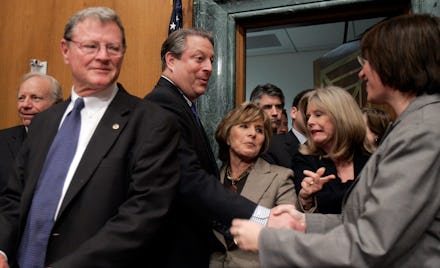People Funding Climate Change Denial Are Hiding Behind Secretive Donor Organizations

Senator Jim Inhofe, left, a noted skeptic of global warming, and former vice president Al Gore.
As we discuss solutions to climate change, including proving to the 23% of Americans who don't believe there is evidence of global warming that it's real, the Koch brothers may be the least of America's problems.
On Monday, March 10, half of the Senate Democrats and the two Senate Independents convened for an entire night to talk about climate change. Although the Democrats hoped the environmental extravaganza would serve to educate the public, what the talks demonstrated most clearly was just how much outside money — not science — is affecting this debate.
Despite Congress' limited foray into the realm of environmental policy since Obama took office in 2008, climate change has recently been moved to the forefront of issues that the Obama's administration cares deeply about. This cannot be illustrated in any simpler way than John Kerry's recent statement that global warming was another "weapon of mass destruction" and his call for international action against climate change.
The Senate's environmental talk-a-thon was not lacking in memorable moments. Sen. Ed Markey (D-Mass.) took a page out of Sen. Ted Cruz's (R-Texas) book by reading Dr. Seuss's The Lorax as the clock ticked toward midnight.
And the inarticulate speech by Sen. Jim Inhofe (R-Okla.) was certainly amusing, albeit cringe-worthy, in its total disregard for information largely agreed upon by the scientific community.
The apparent divide that night over scientific facts is a testimony to how Democrats who support action on climate change and the climate change naysayers are both being funneled huge amounts of money. The problem is that among the climate change deniers, that money is being used to support the spread of inaccurate information.
The backers are certainly not just Exxon or the Koch brothers anymore. As Sen. Al Franken (D-Minn.) mentioned during the climate talk all-nighter, oil and gas companies are no longer the main opposition to climate change policies. Both Exxon and Shell, two of the lead funders of the climate denial movement a decade ago, acknowledge climate change as a concern in their corporate literature and even in advertisements. Chevron even publicized their "7 Principles for Addressing Climate Change" on their website.
To be fair, funding for pro-environmentalist views certainly isn't lacking. Environmental organizations like Greenpeace raise millions of dollars every year and billionaire environmentalist Thomas Steyer fundraised $400,000 for the Democratic Senatorial Campaign Committee. In fact, it wouldn't be far-fetched to assume that Monday's all-nighter had some serious liberal backing, something conservative group Americans for Prosperity was quick to point out.
Though we certainly know where some of the money behind the Democrats' push for climate change policies is coming from, we don't know about all of it. The origin of money going toward climate change denial is also mysterious and a cause for concern because the large amounts of anonymous money include huge contributions from individuals. This is perhaps the biggest impediment to having healthy, effective discussions on climate change within the United States. How is it that in one of the most transparent countries in the world we're unable to pinpoint how large amounts of money distort the policies being made?
The answer lies in donor-advised trust funds, the institutions that channel money from wealthy people seeking a tax break without figuring out which organizations to donate to.
One study published last December by Robert J. Brulle from Drexel University found that conservative foundations have directed more than $900 million to 91 groups that deny the existence of climate change or oppose action against climate change. These groups include think tanks and advocacy groups with close connections to conservative media networks and politicians.
Image credit: Robert J. Brulle
Exactly how much money is being funneled to the climate change denial effort is unclear because not all of those organizations work solely on opposing climate change action. For instance, the American Enterprise Institute and the Heritage Foundation devote themselves to other issues including health care policy and foreign policy. However, what truly makes the origin of this $900 million mysterious is that much of it is channeled through trust funds. These trusts, like Donors Trust and Donors Capital Fund, ensure the anonymity of their donors and, as Whitney Ball, president of the Donors Trust and Donors Capital Fund told the Guardian, they assure donors that the funds will never be diverted to liberal causes.
By some accounts, donor-advised funds are attracting an ever-growing amount of donations — both liberal and conservative — each year. One estimate put the total amount sitting in these funds at $45 billion. This is some big money that can't be attributed to any source.
Image Credit: The Guardian via Greenpeace
While it may be easy to point our fingers at the oil and gas companies for inaction on climate change, as Sen. Barbara Boxer (D-Calif.) did during the talk-a-thon in her admonishment of the 3% of climate change denial scientists who are in partnership with the oil and gas companies, the reality isn't so simple.
A dark pool of money is being directed toward the climate change movement, both in support and in opposition, and we simply have no way of knowing who it's coming from. In many ways, big money determines the fate of the American environmental movement and all the time spent on the Senate floor this week looks different when it's clear that dollars, not facts, are helping dictate votes.
It's past time to clear the political system of all this dark money, and there are plenty of bills on the table to do so.